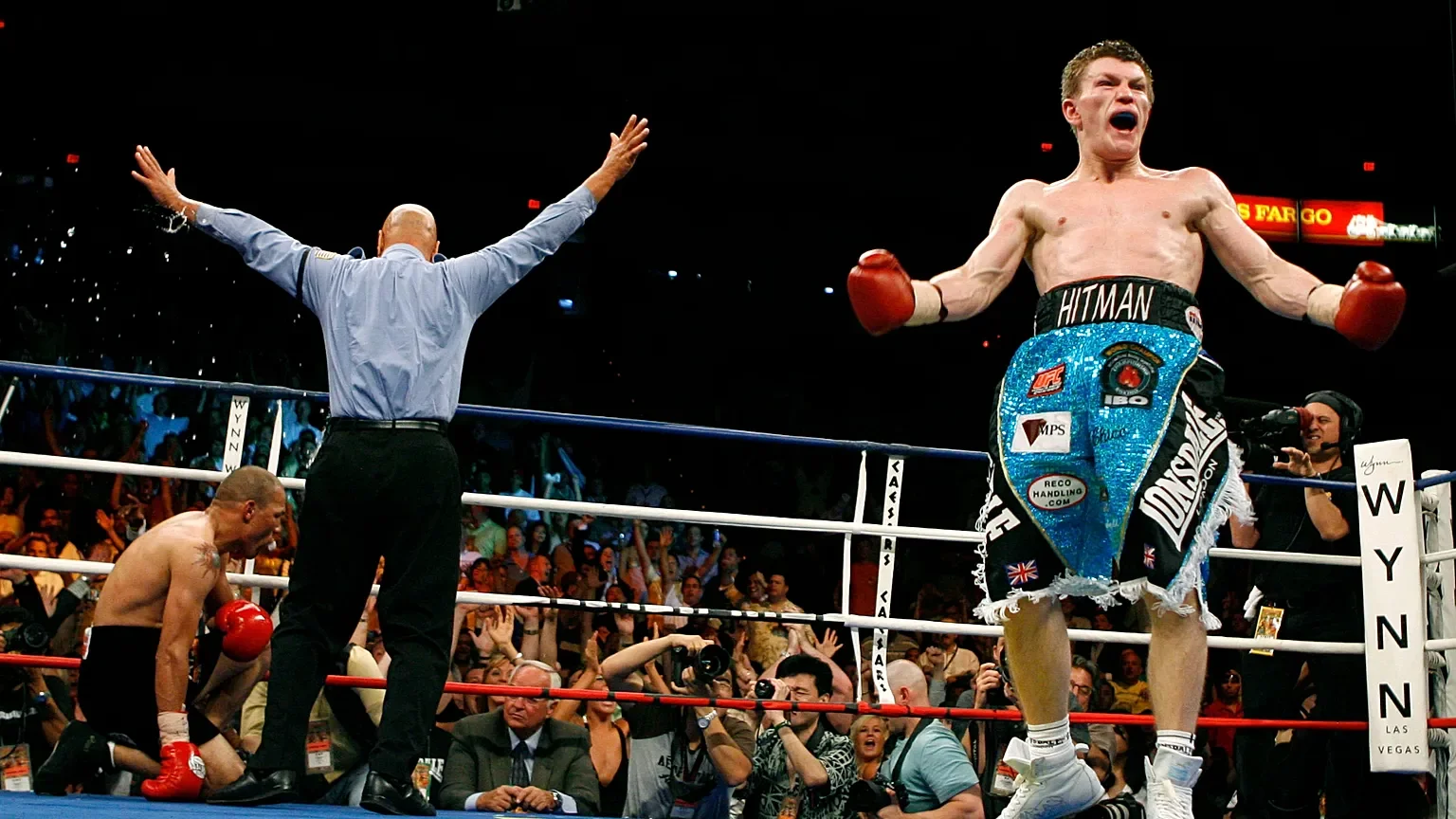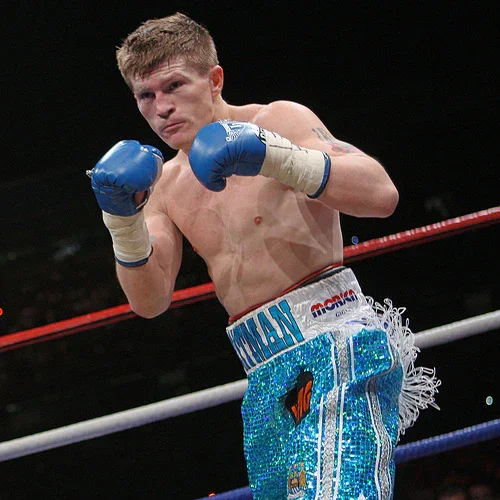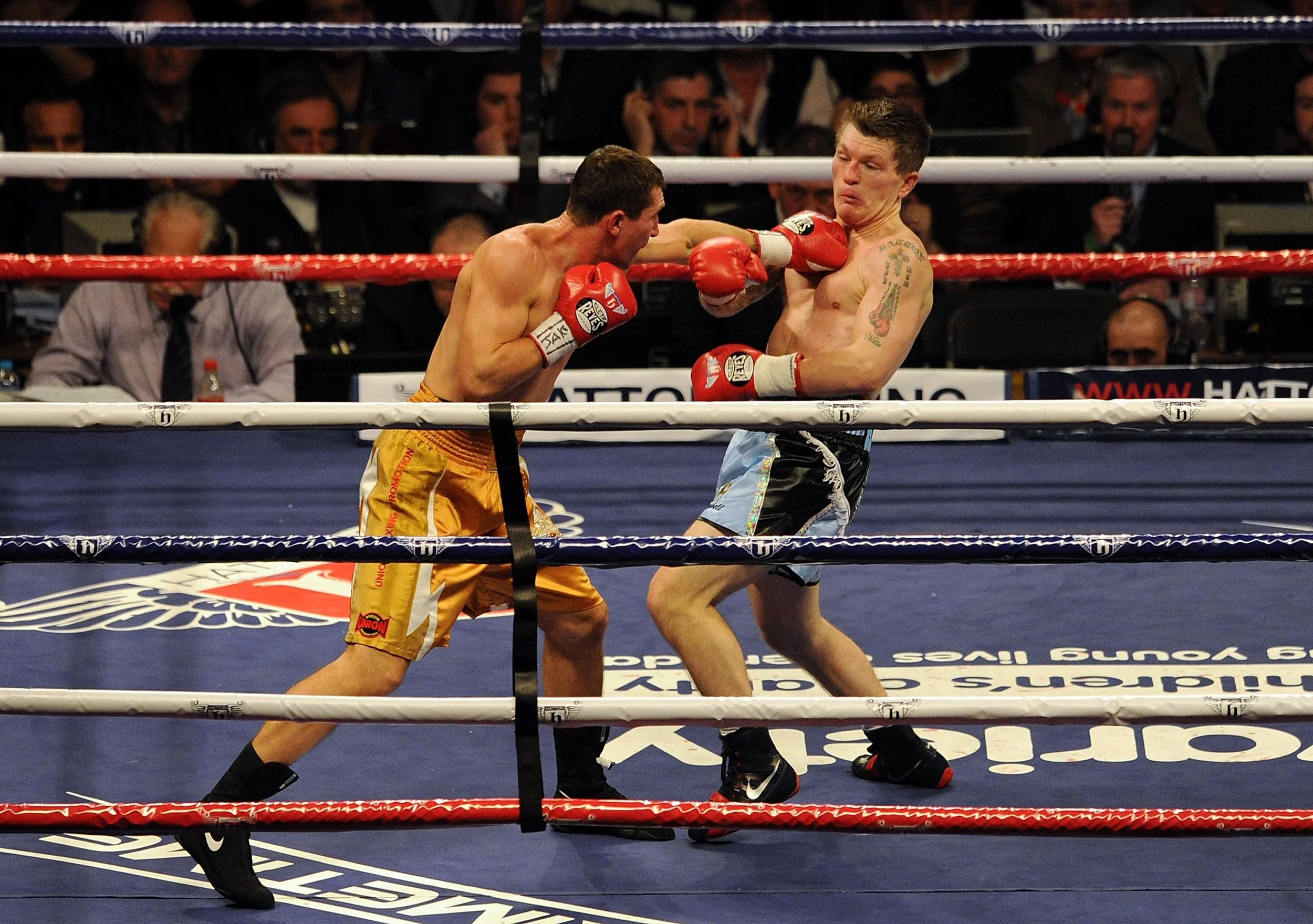FEATURED ARTICLE
THOMAS HAUSER
Ricky Hatton: A Personal Remembrance
THE SCORECARD / RICKY HATTON: A PERSONAL REMEMBERANCE BY THOMAS HAUSER
Ricky Hatton was found dead in his home in Manchester by his longtime friend Paul Speak at 6:45 AM on Sunday, 14 September. He was 46 years old.
Ricky had his demons. All fighters do. Some worse than others. He was a heavy drinker with a ravenous appetite that led to unhealthy weight gains, even during the years when he was fighting. “Weight has always been a problem for me," he acknowledged. "I was a fat kid, and I like my food.”
He was also prone to depression.
Ricky’s father once shared a memory of his son that’s instructive. “As a boy,” Ray Hatton recalled, “Richard liked to play on the slide in the playground. He always waited his turn with the other children. He never jumped the queue. But he never let anybody cut in line ahead of him either. It was a mistake to try that.”
Hatton dropped out of school at age fifteen and worked briefly as a salesman and fitter at a small carpet shop that his parents owned. “He was terrible at both jobs,” his mother, Carol, later reminisced. “But he was good at sports.”
He lived his entire life in Manchester. The city held him dear to its collective heart. He was easy-going, unpretentious, and approachable with a self-effacing sense of humor. Most ordinary people want to be treated like stars. Ricky was a star who wanted to be treated like ordinary people. There was nothing phony about him. He had a kind word for everyone he met.
Hatton won the lightly-regarded World Boxing Union 140-pound title in 2001 and successfully defended it sixteen times. But he was widely thought of as a paper champion until June 4, 2005, when he challenged Kostya Tszyu for the International Boxing Federation crown. Tszyu was "the man" at 140 pounds, having knocked out Zab Judah in a title-unification bout. Hatton battered Tszyu mercilessly. Kostya did not get off his stool for the twelfth round.
Five months later, Ricky solidified his standing with a ninth-round knockout of Carlos Maussa in an IBF-WBA title-unification bout. That brought his record to 40 wins in 40 fights with 30 knockouts. Then he came to America to challenge Luis Collazo in Boston for the WBA 147-pound title.
I met Hatton when I had the privilege of spending the day of the Collazo fight with him, including the hours before and after the fight in his dressing room at TD Banknorth Garden Arena.
On the morning of the fight, I joined Ricky and his team for breakfast in the hotel restaurant. He laughed, joked, and welcomed anyone who came by to chat. At one point, a middle-aged couple left an adjacent table and the man's cell phone dropped to the floor. Ricky rose from his chair, picked it up, and called after the man to give the phone back to him.
As a matter of habit, Hatton's pre-fight breakfast consisted of eggs, bacon, sausage, orange juice, and toast. On the afternoon of a fight, he liked MacDonald's cheeseburgers and french fries.
"He's not fighting on what he eats on the day of a fight," Ray Hatton told me. "He's fighting on all the good food he's eaten in the weeks coming up to the fight. What he eats on fight day is comfort food for him."
Most fighters spend the day of a big fight ensconced in their room with a few team members. When breakfast was done, instead of going upstairs to his room, Ricky moved to the hotel lobby. He stayed there, sitting on a sofa, playing cards and chatting with friends, fans, and anyone else who happened by. The hotel lobby had become his living room. Hours before one of the biggest fights of his life, there were no barriers, physical or otherwise, between Ricky and the world.
"Usually, it's bollocks when people say that someone successful is still the boy next-door," Billy Graham (Hatton’s trainer at the time) told me. "But Ricky is happiest when he's with people he grew up with. He has the same friends he went to school with. He goes to the same places he always went to. He's a regular guy."
Ricky sat in the hotel lobby until 4:00 pm. At one point, he thought back to the final pre-fight press conference two days earlier when Collazo announced that he had a present for him.
"I expected he'd give me a dress or some nonsense like that," Ricky recalled.
Instead, Collazo gave him a six-pack of Guinness. Ricky responded that they could share it after the fight. Collazo said he didn't drink and would opt for a cup of tea instead.
"That was music to my ears," Ricky told the people in the hotel lobby. "I thought, 'Now I'll get to drink it all myself.'"
Hatton liked a loud dressing room with a party atmosphere on fight night. The dressing room prior to Hatton-Collazo was no exception. As soon as he entered, he began playing rock music at a near-deafening decibel level. As time passed, a stream of well-wishers came by. The center of the room belonged to Ricky, who was in non-stop motion, walking, shuffling, skipping, and shadow-boxing. His corner men shouted to each other above the din to be heard.
At ten o'clock, Ricky gloved up and began hitting the pads with Graham. A loud grunt accompanied each punch. A ferocious look crossed his face. He was no longer nice Ricky, the boy-next-door. He was Freddie Krueger, who no one would want living in their neighborhood.
It was a hard fight. Ricky won a unanimous decision.
Nineteen months later, Hatton fought Floyd Mayweather at the MGM Grand in Las Vegas. There was a buzz in Sin City throughout fight week. An estimated 18,000 Hatton fans had crossed the ocean to support their man. Most of them didn’t have fight tickets and would watch Mayweather-Hatton at closed-circuit locations around the city.
“I thought I was in Manchester when I got here,” Ricky quipped.
Once again, I was with Ricky on the night of the fight. As soon as he entered his dressing room, he connected the wires on an audio-system that he’d brought with him and positioned the speakers where he wanted them. Music began blaring. For the next two hours, except when he sat for his hands to be taped, Ricky was on his feet. Moving like a hyper-active child, pacing and shadow-boxing with increasing intensity.
Sugar Ray Leonard came in to wish Ricky well; then sat down beside me. The music got louder.
“This is giving me a headache,” Ray said. “I’m too old for this.”
But he stayed.
At seven o’clock, Ricky changed tracks and the raspy voice of Mick Jagger was heard.
“I can't get no satisfaction . . .”
Ricky picked up the pace of his shadow-boxing and began singing aloud.
“I can't get no satisfaction . . . Cause I try and I try and I try and I try.”
Soon everyone in the room was singing.
“I can't get no . . . I can't get no . . . When I'm drivin' in my car, and that man comes on the radio . . .”
David Beckham came in. He and Ricky had met earlier in the year and been texting back and forth ever since. Ricky had gone to a Los Angeles Galaxy soccer game as Beckham’s guest. Now the favor was being returned.
Beckham wished Ricky well, then stood by the door, maintaining a distance; one world-class athlete respecting the mental preparation of another.
Recording star Tom Jones (who would sing God Save The Queen later in the evening) entered.
Ricky looked up. “Is Elvis coming too?” he queried.
The stars seemed aligned for a magical night. But it wasn’t to be.
Ricky moved forward from the start of the fight, with Mayweather pot-shotting from the outside. The crowd roared with every blow that Ricky landed. But Floyd’s hands were faster. Much faster. And referee Joe Cortez made the challenge for Hatton even more daunting.
To get inside, Ricky had to navigate past Mayweather’s fists and also Floyd’s left elbow. Once inside, he was frequently fouled. Mayweather was allowed to go low; hold; and use his head, forearms and elbows as offensive weapons. Often, Ricky maneuvered into position to work effectively and Cortez broke the fighters even though Ricky was still punching. By breaking them prematurely again and again, the referee denied Ricky the chance to impose his physical strength and forced him to fight much of the battle at long range. That exposed him to Floyd’s potshots as he tried to work his way inside again.
In the first round, Cortez broke the fighters eleven times; many of them when one or both of the men had an arm free and was punching. It got worse from there. Thirteen times in round two and fourteen in round three when Floyd opened an ugly gash above Ricky’s right eye. Ricky persevered. In round five, he did his best work of the night, winning the stanza on the cards of all three judges. Significantly, Cortez broke the fighters only four times in that round. But it was all downhill after that. In round ten, Ricky was knocked out.
“It wasn’t a humbling experience because I’m humble to begin with,” he said afterward. “But it was devastating.”
There were four more fights. Two losses and two draws. Ricky retired in 2012 at age 34 with a record of 45 wins and 3 losses. He was ill-advisedly teasing a comeback when he died.
Many words have been written about Hatton since his passing. I’d rather that his own words serve as his epitaph:
"I fight like a lunatic. I'm very aggressive in the ring. It's very un-British, the way I fight. But there's a lot of thought to what I do. Watch carefully how quick I move in on my opponents, how I change the angles. It's only when fighters actually get in there with me that they realize there's a method to the madness.”
“No matter how many pints you have, no matter how many parties you go to; when you get your hand raised at the end of a fight, it's the greatest feeling in the world.”
“When I fight, I want to give the fans value for money. There’s two things you’ll always get from me - an honest effort in the ring and an honest answer out of it.”
“People watch me because I’m an exciting fighter. But I think they watch me too because they look on me as a mate. I don’t expect people to roll out a red carpet when I walk down the street. There are no bodyguards. I don't want VIP treatment. I’m just a normal kid doing very well at what he does. I like my food. I’ll go to the pub for a few pints and to throw darts. When I fight in Manchester, most of the people in the arena have shaken hands with me. The best thing about being a fighter is when people come up to me and say, ‘Ricky, you're a world champion and you're just like me.’ What the fans think means a lot to me. There's no point in being a great fighter if people think you're a dickhead.”
Thomas Hauser's email address is thomashauserwriter@gmail.com.
His most recent book – The Most Honest Sport: Two More Years Inside Boxing - is available at:
In 2019, Hauser was selected for boxing's highest honor - induction into the International Boxing Hall of Fame.




